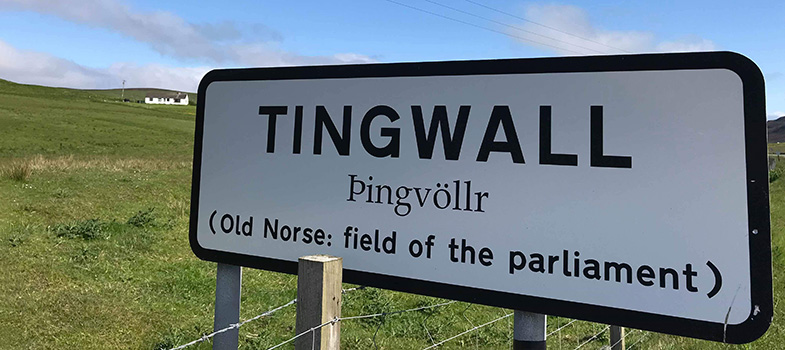Learning the Scots language
Each unit comprises specific features to help you:
familiarise yourself with the Scots language
learn through acquiring new vocabulary and developing your receptive skills
develop your productive skills by writing and speaking.
1 Handsel
This feature introduces you to two Scots words related to the content of the unit. The Handsel also shows examples of how these words are used in context, and you will see an image reflecting the meaning of the words. You will be able to listen to spoken example sentences, record yourself speaking them, and then compare your pronunciation with the model.
Each Handsel links to the entry for the word in the Dictionary of the Scots Language [Tip: hold Ctrl and click a link to open it in a new tab. (Hide tip)] to encourage you to explore the meaning and history of the words further.
Here an example of this for the word Handsel.
- Handsel
- Definition: a gift, bestowed to commemorate an inaugural occasion, event or season; a first payment received by a trader bringing good luck; a first taste or experience; a present of food.
Example sentence: “Come awa', Mrs Timmerman, an gie's hansel, an' I'll gie ye th' pick o' ma pack” (Helen Beaton, At the Back o' Benachie, 1915).
- English translation: “Come on, Mrs Timmerman, be my first customer and I’ll give you the best of my lot.”
Further reading
Find out some more about the tradition of a Handsel when reading about the “Mareel” project, a music, cinema and creative industries centre on Lerwick’s quayside. As the Mareel was being built, during the construction phase, people were invited to record their feelings for the building in the form of a hansel, which were then collected in the form of glass jars. The jars were then buried within the walls of the building. There is a link here with more information https://www.mareel.org/ blog/ hansel-for-mareel-project-to-launch-on-23-december
2 Reading
You will come across many different extracts for reading in Scots. These will not only help you learn to read the language, they will also exemplify the differences in spelling Scots words that occur due to the fact that Scots is a non-standard language. The course uses a wide range of types of written texts in Scots from personal letters to policy documents.
You will work on translating parts of reading texts from Scots into English to find out more about the differences between and similarities of both languages.
Please note that all Scots words in the course are written in italics, or in standard font should the surrounding text be in italics.
3 Listening
To support you in learning to understand spoken Scots, the course will provide you with a wide range of audio resources alongside transcripts of recordings and study tips on how you can work on developing your listening skills.
In addition, you will find many links to audio-visual resources in which people speak different Scots dialects.
4 Writing
Although there is no commonly agreed standard for written Scots, you will gradually develop your writing skills in Scots using words from different Scots dialects. In connection with being exposed to a variety of Scots examples in different text types and using the knowledge of Scots grammar you will acquire, you will be guided in starting to write in Scots.
5 Speaking
To help you learn to speak some Scots and develop a good awareness of Scots pronunciation in different dialects, you will be introduced to different speakers and use the recording and playback tool, you will be able to practise imitating the pronunciation of words, phrases, sentences and longer speech of these speakers.
6 Language links
Through the feature of the ‘Language links’ you will be taught how Scots has close links with many other European languages. You will learn to identify similarities in words from other languages with Scots words and expressions, and you will explore the origins of foreign words used in Scots and how these came to be included in Scots vocabulary.
7 Dictionary skills
This course teaches you how to work effectively with the Dictionary of the Scots Language to help you explore nuances of meaning in Scots words and expressions, translate from and, partly, into Scots, and to take your study of the Scots language further on your own.
Unit structure

